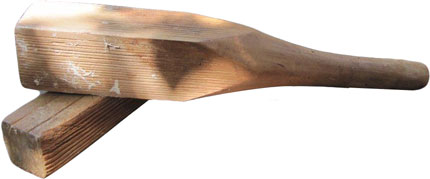 Tapa, the "clothing" of earlier Polynesuan civilization, is made from the bark of the mulberry tree by a laborious and lengthy process that uses a heavy mallet called an E'I to pound strips of dried bark into fiber. The fiber is then bound to itself, sometimes in one layer or two. The finished product is similar to a thick, rough piece of paper towel.
Tapa, the "clothing" of earlier Polynesuan civilization, is made from the bark of the mulberry tree by a laborious and lengthy process that uses a heavy mallet called an E'I to pound strips of dried bark into fiber. The fiber is then bound to itself, sometimes in one layer or two. The finished product is similar to a thick, rough piece of paper towel.
For nearly six decades of relatively recent years, the sound of the tapa mallets lay silent on Pitcairn Island, after the Polynesian women who had come on H.M.S. Bounty and their descendants had pounded the fiber into clothing and other items for well over a century and a half. Then in November, 2005, Pitcairner Meralda Warren determined to re-learn the lost art as a revival of the island's earlier culture.
"Although I had never done it before," says Meralda of the long, laborious process, "it all came naturally, and soon I had this stretched-out piece of bark about 150mm by 500. It looked a bit thin so I cut another piece (of bark) and pounded that out. Then I pounded them together, finishing with the flat side of the E'I (mallet)."
Today, thanks to Meralda's determination to bring back part of Pitcairn's past culture, she and a number of her disciples on the island are making decorative tapa that is finding its way into the farthest corners of the world.
The Pitcairn Islands Study Center is honored to serve as an outlet for Pitcairn tapa. All of it made in the same slow, labor-intensive way the Polynesian-Pitcairn women of the past centuries made tapa.
Your purchase of any of the Pitcairn tapa shown below may be made by U.S. dollars: 1. By secure PayPal.com. 2. By VISA, MasterCard or Discover credit caard, or by check made to "Pitcairn Islands Study Center", 1 Angwin Avenue, Angwin, CA 94508 USA. For any address outside the United States add $10.00 to price shown for postage and handling. Use the exact name of the tapa desired, and provide your full name and address. No returns accepted.





